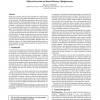Free Online Productivity Tools
i2Speak
i2Symbol
i2OCR
iTex2Img
iWeb2Print
iWeb2Shot
i2Type
iPdf2Split
iPdf2Merge
i2Bopomofo
i2Arabic
i2Style
i2Image
i2PDF
iLatex2Rtf
Sci2ools
130
click to vote
ICS
1994
Tsinghua U.
1994
Tsinghua U.
Evaluating automatic parallelization for efficient execution on shared-memory multiprocessors
We present a parallel code generation algorithm for complete applications and a new experimental methodology that tests the efficacy of our approach. The algorithm optimizes for data locality and parallelism, reducing or eliminating false sharing. It also uses interprocedural analysis and transformations to improve the granularity of parallelism. Although the individual components of the algorithm have been published previously, their coordination is unique to this paper. For experimental validation, we do not attempt to parallelize `dusty deck' programs where many have tried and failed. Instead, we collect programs where the users tried to achieve excellent parallel performance. We apply our optimizations to sequential versions of these programs, i.e., the compiler was required to use its analysis and algorithms to parallelize the program and could not rely on user assertions that for example, a loop is parallel. With this metric, our algorithm improves or matches hand-coded par...
Algorithm | Distributed And Parallel Computing | Hand-coded Parallel Programs | ICS 1994 | Parallel Code Generation |
Related Content
| Added | 09 Aug 2010 |
| Updated | 09 Aug 2010 |
| Type | Conference |
| Year | 1994 |
| Where | ICS |
| Authors | Kathryn S. McKinley |
Comments (0)

